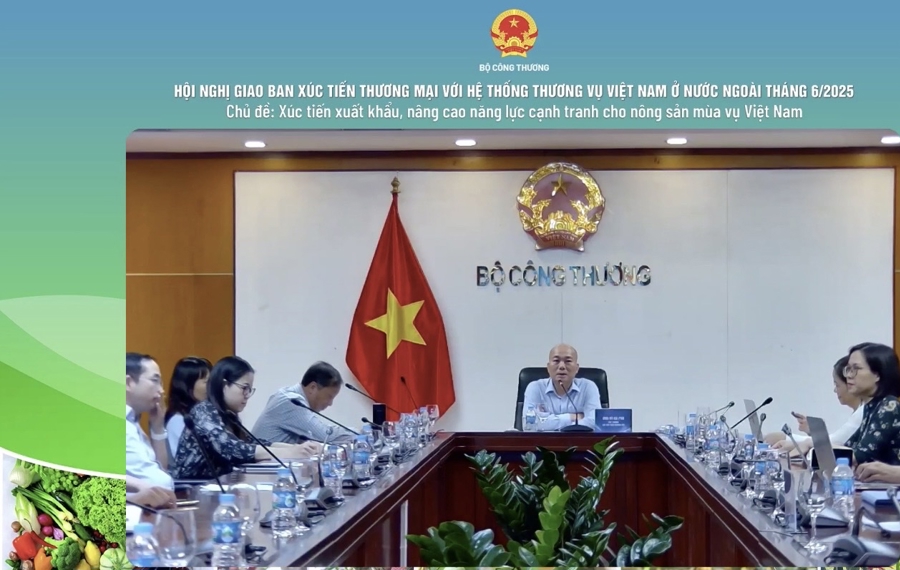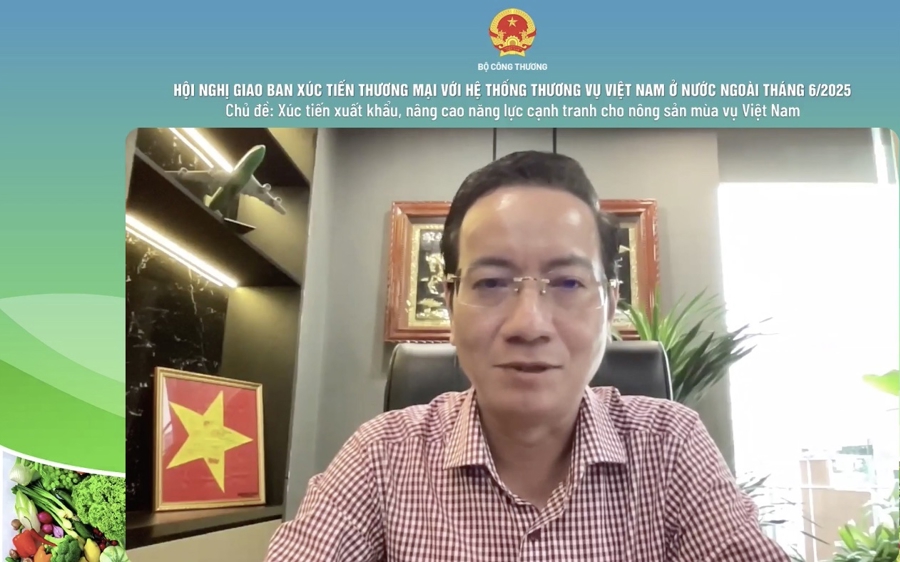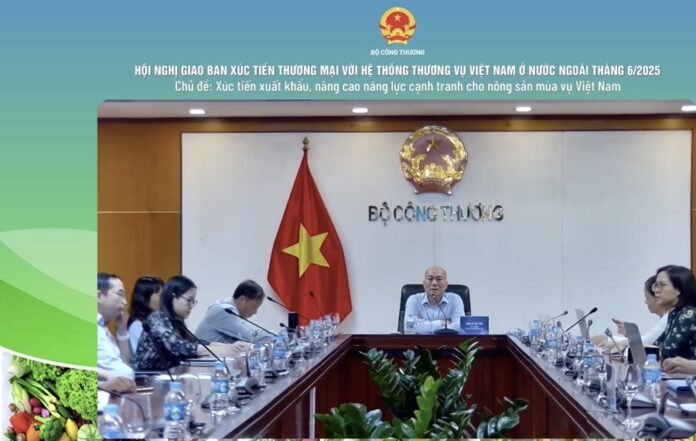The Ministry of Industry and Trade recognizes the challenges faced by Vietnam’s agricultural sector, especially seasonal produce, in maintaining orders, market share, and competitiveness in the global market amidst economic instability and rising protectionism.
LACK OF MARKET INFORMATION AND NEGOTIATION SKILLS
Tightening technical standards, traceability requirements, and labor conditions in major agricultural import markets, coupled with intense commercial competition, pose significant obstacles for domestic businesses. Small-scale production, lack of value chain integration, outdated preservation and processing technology, and seasonal nature of crops create pressure on harvesting and transportation, leading to bottlenecks and price drops.
At the June 2025 Trade Promotion Conference with the Vietnamese Trade Offices Abroad, focusing on “Promoting Exports and Enhancing Competitiveness for Vietnam’s Seasonal Agricultural Products,” Ms. Le Thi Hong Anh, Director of the Center for Investment, Trade, and Tourism Promotion of Son La Province, shared the province’s potential for seasonal fruits such as strawberries, plums, lemons, mangoes, bananas, and longans. However, farmers often face price drops during bumper harvests due to limited market access.
Ms. Hong Anh attributed these challenges to inadequate transportation infrastructure, limited product quality, subpar preservation technology, and a shortage of standardized cold storage facilities. Additionally, cooperatives fall short in maintaining production journals, ensuring traceability, and adhering to food safety standards, hindering their ability to connect with processing and export enterprises.

Local businesses, cooperatives, and associations also face limitations in their international expansion capabilities, lacking market information, commercial negotiation experience, and brand protection knowledge.
Ms. Ngo Thi Thu Hong, CEO of Ameii Vietnam JSC, highlighted the significant market opportunities for Vietnamese fruits as global demand for tropical produce rises. The reputation and quality of Vietnamese agricultural products are steadily improving, gaining recognition in international markets, particularly in premium segments.
However, the diverse quarantine requirements of different countries pose challenges for businesses, necessitating multiple technical approaches. For instance, the Japanese market mandates the use of Methyl Bromide for treating lychees, while the Korean market requires hot water treatment, and the US market demands irradiation.
Additionally, only facilities in Ho Chi Minh City are authorized to irradiate lychees for export to the US market, creating logistical complexities in transporting fresh lychees from the north and maintaining their freshness during the journey.
Vietnam’s high logistics costs also hinder the price competitiveness of its enterprises compared to rivals from China, Mexico, and Taiwan.
PROMOTIONAL TOOLS FALL SHORT OF PRODUCT QUALITY
To enhance the visibility of Vietnam’s potential fruit products in international markets, Mr. Nguyen Dinh Tung, CEO of Vina T&T Group, emphasized the need for aggressive promotion of distinctive Vietnamese products, transforming them into annual attractions for global consumers.
Citing the example of their successful branding of longans as “King Longans,” Vina T&T Group has been exporting this fruit to the US market for six years. “As we approach the longan season, which is about a month away, we have been inundated with orders, and American consumers eagerly anticipate this delicious fruit, which surpasses the quality of longans from Thailand and other countries,” shared Mr. Tung.

Despite the exceptional quality of Vietnam’s seasonal fruits, Mr. Tung attributed their relatively low recognition among foreign consumers to inadequate promotional tools. Currently, enterprises independently explore markets and establish brands. Therefore, Mr. Tung sought support from foreign trade offices in this regard. Vina T&T Group is willing to share information about the longan season and the quality of their fruits with all trade offices to collaboratively promote longans as a signature Vietnamese product.
Observing global trends, Mr. Tung noted that each country has a signature fruit. For instance, New Zealand is known for its kiwis, the US for Washington apples, and South Korea for its large-grained grapes. While Vietnam produces a diverse range of fruits, it lacks a distinctive brand. The country’s fruits are delicious, but a national fruit brand is yet to be established.
Mr. Tung acknowledged the benefits of a national brand in promoting products. However, the stringent criteria for such an endeavor are challenging for fruit enterprises to fulfill. Notably, fresh fruit exports offer the highest value, and fresh produce is the primary focus of global markets.
Mr. Tung commended the vigorous support for trade promotion provided by Vietnam’s representative offices abroad. The Trade Promotion Agency has consistently aided the Vietnam Fruit and Vegetable Association in participating in two prominent international exhibitions: one in Hong Kong in September 2025 and the other in Germany in February 2026.
Mr. Tung shared, “Our presence at these exhibitions has grown from 16 booths initially to 20 and now 24. These exhibitions attract global attention for tropical fruits.” He expressed his desire for the trade offices to promote Vietnam’s booths at these exhibitions, enabling customers to discover suitable Vietnamese suppliers for fruit imports.
Vina T&T Group has successfully leveraged these exhibitions, consistently participating, expanding its presence, and acquiring new and valuable customers.
Echoing this sentiment, Mr. Vu Ba Phu, Director of the Trade Promotion Agency, affirmed the Agency’s readiness to collaborate with Vietnamese embassies and trade offices abroad in organizing mini-exhibitions within embassy compounds or local venues to showcase Vietnamese products. He emphasized the importance of identifying target markets and specific objectives by associations and enterprises, along with clear requests to the Agency.
“If enterprises have a specific target market in mind, we can organize a few mini-exhibitions in that market each year. We are prepared to work with our embassies and trade offices, and they are willing to engage with the embassies to support enterprises and associations,” assured Mr. Phu.



![[Photo Essay]: Experts, Managers, and Businesses Unite to Forge a Path Towards Sustainable Green Industry](https://xe.today/wp-content/uploads/2025/07/z678592918-218x150.jpg)


![[Photo Essay]: Experts, Managers, and Businesses Unite to Forge a Path Towards Sustainable Green Industry](https://xe.today/wp-content/uploads/2025/07/z678592918-150x150.jpg)


![[Photo Essay]: Experts, Managers, and Businesses Unite to Forge a Path Towards Sustainable Green Industry](https://xe.today/wp-content/uploads/2025/07/z678592918-100x70.jpg)






